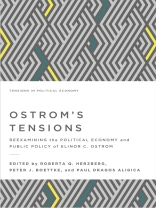Elinor C. Ostrom won the Nobel Prize in Economics in 2009, with recognition for her path-breaking work on institutions organized to address common-pool resource settings. She and her collaborator and spouse, Vincent Ostrom, contested the scholarship of mainstream political economy, public administration, and public policy in their quest to understand how individuals resolve a variety of social dilemmas. Ostrom’s work challenged the belief that a system of governance based on expert public officials could perform better and should a priori be preferred to a system based on citizens’ self-governance. Like any great and productive scholar, her body of work includes tensions, flaws, and inconsistencies that must be confronted by scholars looking to engage, critique, and advance her distinctive project in political economy.
Starting from the recognition that Ostrom’s work remains open for contestation and improvement, Ostrom’s Tensions: Reexamining the Political Economy and Public Policy of Elinor C. Ostrom presents a critical assessment of Ostrom’s research and ideas. The contributions to this edited volume, which include original chapters by several of Ostrom’s colleagues and students, identify sources of tension within her writing. The research program Ostrom developed continues as an open-ended project advancing adaptable models and polycentric governance solutions rather than static models and one-size-fits-all policies. Taken as a whole, this volume identifies important questions and areas for future research by the next generation of political economists.
Table of Content
Introduction
Roberta Q. Herzberg, Peter J. Boettke, and Paul Dragos Aligica
Section 1: Theoretical Tensions
Chapter 1
Beyond a Precarious Balance: Improving the Scientific Rigor and Policy Relevance of Institutional Analyses from the Bloomington School
Michael D. Mc Ginnis
Chapter 2
An Intricate Move toward Reality: Elinor Ostrom and Scientific Realism
Adrian Miroiu
Section 2: Public Administration Tensions
Chapter 3
“What Should We Do?” The Bloomington School and the Citizen’s Core Question
Peter Levine
Chapter 4
Social Recontracting
Adam Martin
Chapter 5
Institutional Complexity and the Public Choice Analysis of Feasible Policy Changes
Vlad Tarko
Section 3: Methodological Tensions
Chapter 6
Whose Problems are Being Solved? Polycentric Governance and ‘The Political’
Andreas Thiel and Erik Swyngedouw
Chapter 7
In Praise of Eclecticism: Why Elinor and Vincent Ostrom’s Works Matter
Aurelian Craiutu
Contributors
About the author
Roberta Q. Herzberg is distinguished senior fellow with the F. A. Hayek Program for Advanced Study in Philosophy, Politics, and Economics at the Mercatus Center at George Mason University.












